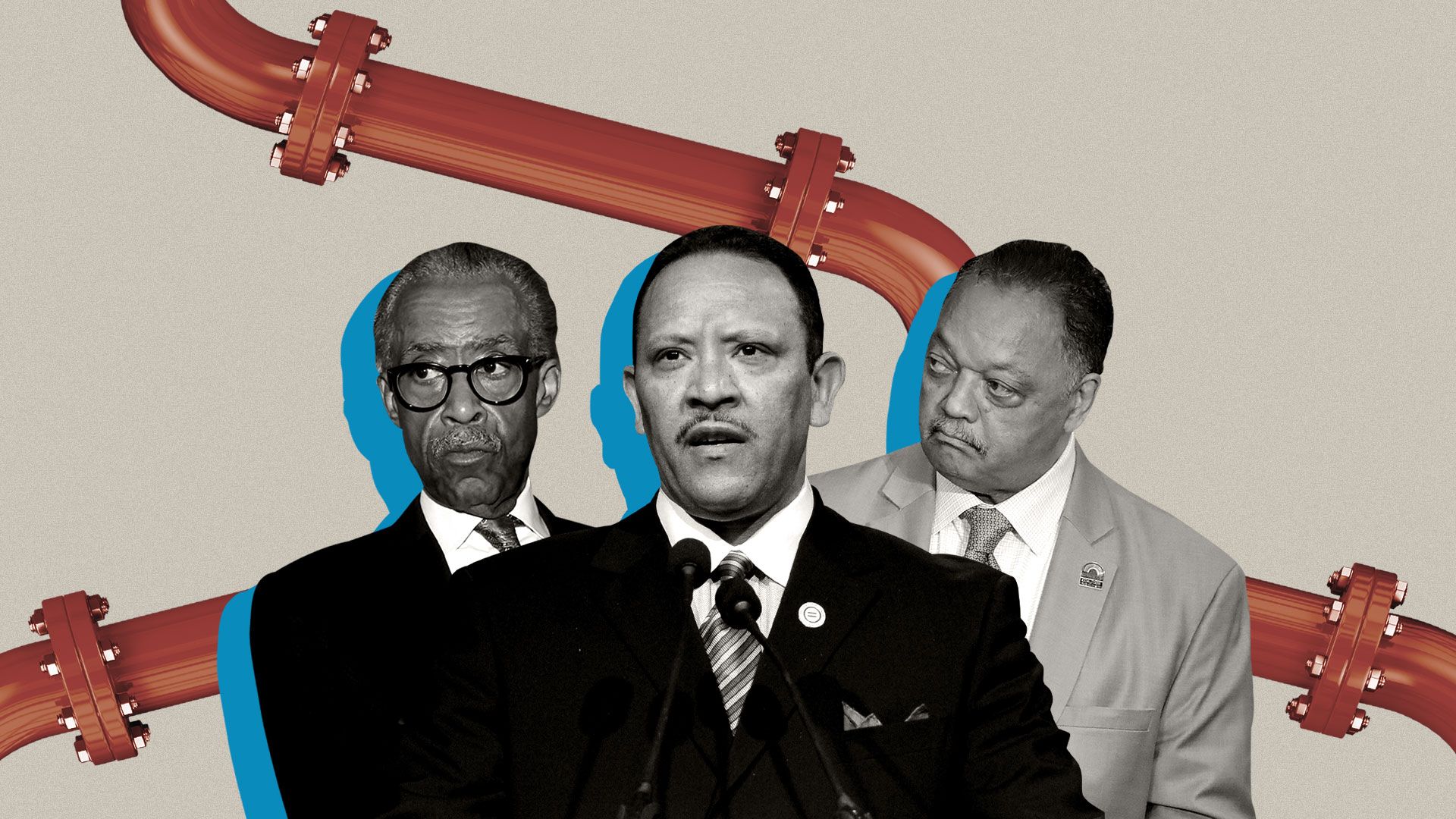Exclusive: Civil rights leaders oppose swift move off natural gas
Add Axios as your preferred source to
see more of our stories on Google.

Photo Illustration: Eniola Odetunde/Axios
Top American civil rights activists are opposing an abrupt move away from natural gas, putting them at odds with environmentalists and progressive Democrats who want to ban fracking.
Driving the news: In recent interviews, Revs. Al Sharpton and Jesse Jackson and National Urban League President Marc Morial said energy costs are hitting people of color unfairly hard. These concerns, expressed before the coronavirus pandemic, are poised to expand as paychecks shrink across America.
What they’re saying:
- “I think people are concerned about the affordability and they are concerned about being left in the cold,” Sharpton told me in early March. “I think natural gas is a temporary — I don’t think we ought to make it the end-all, be-all — solution, but in the interim, people in communities of color should not pay the brunt of suffering through cold winters.”
- “I support the call [to ban fracking] with a proper transition,” Jackson told me in February. “In the meantime, those who are down and out have to have it in the meantime.”
Where it stands: Fracking, the controversial oil and gas extraction method, has unlocked vast reserves of natural gas across the country over the past decade. That’s providing a cheap and relatively cleaner fuel for electricity, heating and manufacturing.
- Lower-income people spend a disproportionate amount of their paychecks on heating, electricity and transportation. This is especially so in black and Hispanic communities, where poverty rates are higher.
- In recent years, environmentalists and progressive Democrats, including presidential candidate Bernie Sanders, have increasingly opposed natural gas and are calling to ban fracking because of its role in heating up the planet.
- Gas is still a fossil fuel that emits methane, a potent greenhouse gas. But it emits far less carbon dioxide when burned compared to coal and very little particulate matter pollution.
“I would not want to cite a specific instance, but generally speaking, people are debating these issues in some instances without consultation with the leaders of the African American communities and neighborhoods affected by these issues,” Morial said.
- When asked about natural gas, Morial described his position in a way that Sanders and a growing number of environmentalists oppose.
- “Natural gas is a bit of a bridge fuel,” Morial said. “It’s a fuel that we need to have access to because the transition to alternatives is a long-range transition.”
How it works: A lot of factors influence electricity and heating costs, including weather and usage. Another key one is the availability and delivery of energy, whether it’s natural-gas pipelines, propane shipments or power lines.
- In New England and New York state, a handful of major natural-gas pipelines have been scrapped in recent years, partly due to opposition from politicians and environmental activists. This has occurred while those regions have increased their dependence on gas for electricity.
- Those pipelines likely would have helped lower the area’s energy costs in the winter, which are usually higher in the cold months compared to other parts of the country, according to data and experts from the U.S. Energy Information Administration.
The other side: Tamara Toles O'Laughlin, North America director for 350.org, one of the most influential climate activist organizations in the world, said 80% of the members of the group’s U.S. leadership are people of color. Choosing between energy poverty and opposing fossil fuels is a “false dichotomy,” she says.
- “It is our duty as people who have any measure of privilege to take a position that evokes systematic change, because if we do not, then we’ll all fail,” Toles O’Laughlin said. “Incremental decision-making only benefits the energy system that we’re stuck in.”
- She said 350.org doesn’t have relationships with the Rainbow PUSH Coalition (led by Jackson), National Action Network (led by Sharpton) and Morial’s National Urban League. “But we are open to it because a lot of our work on energy access and justice overlaps.”
Between the lines: Scrutiny of money ties between fossil fuel companies and people of color run deep. The NAACP issued a report last year describing what it said were manipulation tactics by the sector.
It was an attempt to dissuade local NAACP chapters from accepting energy-industry money, the New York Times reported earlier this year.
- Jackson said he has not received money from natural-gas companies as he pushes for a gas pipeline in Illinois.
- Sharpton’s left-leaning National Action Network doesn’t have to disclose its donors given its tax structure.
- The National Urban League receives donations from most parts of corporate America, including major oil companies.
- Morial said he doesn’t monitor donations and that they go toward causes the group deems important regardless. He criticized what he describes as a long tradition of unfairly accusing people of color of falling victim to industry money.
"Whenever someone disagrees with what you say, they think, 'Oh, you must be getting paid,'" Morial said. “It’s condescending, patronizing and racist. I hope you print it. I want them to see it. Because that’s the way we feel."
What’s next: Stay tuned for a deeper dive into the pipeline project Jackson is backing in Illinois.
